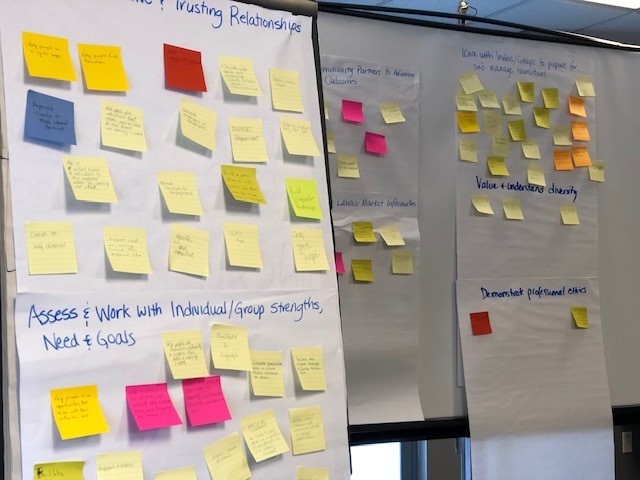Together, we can develop a strong evidence base.

CCDF believes that who you directly involve in the research has a lot to do with how well the findings are implemented into practice. CCDF’s research projects are conducted in partnership with front-line practitioners working with real clients and/or directly with people who are the subject of the research. Our research protocols have been consistently guided by the following principles:
- New interventions/programs/service delivery models must reflect front-line realities and practices or they will never be adopted into longer-term practice, regardless of results;
- Full engagement and buy in of research partners is essential. This includes front-line practitioners, their clients, their supervisors and management in career service settings. In education settings, this includes students and those that have left school prior to graduation, teachers, guidance counsellors, principals, government officials, employers, and community members. We are mindful in any research project to actively seek out and include under-represented voices;
- Involvement in a research project is a professional and organizational development opportunity that benefits clients, professionals, educators and management and supervisors.

Working with those on the front-lines results in outcomes that are grounded in reality and informs practice moving forward.
Our research

Pan-Canadian Mapping Study of the Career Development Sector
Key Researchers:
In Canada, we have had virtually no data on the career development sector – its hiring practices, training/professional development trends, human resource challenges, composition and needs of clients it serves or the extent to which jurisdictions are applying competency profiles such as the Canadian Standards and Guidelines for Career Development Practitioners (S&Gs). The Forum of Labour Market Ministers undertook to fill this void, engaging CCDF to map the career development sector across Canada. Highlights and recommendations for action are included in the executive summary.
Demonstrating the Value of Human Services Evaluation Framework
Key Researchers:
The CRWG is a unique coalition of Francophone and Anglophone researchers from six Canadian universities (University of Victoria, University of British Columbia, Simon Fraser University, University of Calgary, Université Laval and Université de Sherbrooke) committed to proving of the impact of career development programs and services. Members of the CRWG are independent researchers who collaborate on common projects and engage in distinct and related research projects separate from the CRWG. Members of the CRWG also form collaborative partnerships with international researchers.
The framework has been used extensively to evaluate career development interventions, but it also is appropriate in other types of counselling settings, mental health settings, physical health settings, other human services settings, and educational settings.
Making Bridges Visible: An Inventory of Innovative, Effective or Promising Canadian School-to-Work Transitions Practices, Programs and Policies
Key Researchers:
This report highlights an initial inventory of current Canadian practices, programs and policies aimed at improving school-to-work transitions for school-leavers (both from secondary and post-secondary groups). The report provides a situational analysis of Canadian youth in transition and highlights the elements that make up successful school-to-work initiatives. It also points to the need for a more consolidated and collective school-to-work strategy endorsed by all levels of government and makes 12 recommendations for further action.
Applying the Construct of Resilience to Career Development: Lessons in Curriculum Development
Key Researchers:
The purpose of this paper is to summarize the results of background research conducted by CCDF, consolidating and extrapolating key themes from this research to the development of the Future to Discover Grade 12 curriculum. A secondary purpose of this paper is to open the door to further exploration of the potential application of the construct of resilience to career theory and practice.








